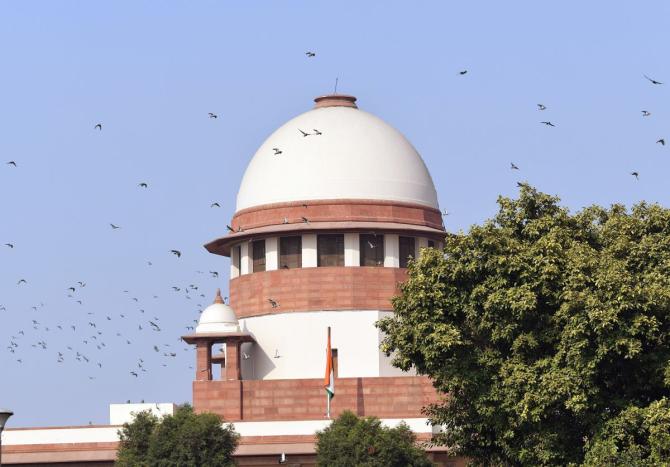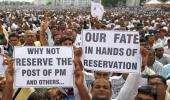The Supreme Court on Thursday declined to overturn the Patna high court's interim order suspending the Bihar government's caste survey.

The first round of caste survey in Bihar was conducted between January 7 and 21.
The second round started on April 15 and was supposed to continue till May 15.
A bench of justices Abhay S Oka and Rajesh Bindal said it would have to examine if the exercise being carried out is a census in the garb of survey.
Justice Bindal orally remarked during the hearing that a lot of documents show the exercise is census only.
"We are making it clear, this is not a case where we can grant you interim relief," the bench said.
The apex court noted that the high court had posted the hearing of the main petition on July 3.
"We direct that this petition be listed on July 14. If for any reason, the hearing of the writ petition does not commence before the next date, we will hear further submission canvassed by the senior counsel for the petitioner (Bihar)," the bench said.
At the outset, senior advocate Shyam Divan, appearing for the Bihar government, submitted that the high court is completely at error and said the current exercise is not a census but only a voluntary survey.
While trying to explain the difference between the two, Divan said survey is of a certain quality which has to be for a span of period.
"For census you have respond. If you don't you are met with penalty. Not so for survey. Quantifiable data is required for state policies. Supreme Court judgements say so," Divan said.
The senior lawyer stated that one of the concerns of the high court was the issue of privacy.
"Data would be stored only on the servers of the Bihar government and not on any other cloud. It is a foolproof system. We are open to suggestion by the court," he said.
The top court, however, told Divan out that the high court had already gone into those aspects.
"High Court has gone into it and said stop for now. The High Court had flagged data privacy issues," the bench said.
Divan further submitted that resources have already been mobilised and 80 per cent of the survey work has already been completed.
The top court, however, asked the state government to argue the matter before the high court on July 3 where the matter is still pending.
In an appeal filed before the top court against the May 4 order of the high court, the Bihar government had said the stay will adversely affect the entire exercise.
The state government said the collection of caste-based data is a constitutional mandate under Articles 15 and 16 of the Constitution.
Article 15 of the Constitution says the State shall not discriminate against any citizen on grounds only of religion, race, caste, sex, place of birth or any of them, while Article 16 states there shall be equality of opportunity for all citizens in matters relating to employment or appointment to any office under the State.
'The State has already completed more than 80 per cent of the survey work in some districts and less than 10 per cent of work is pending. The entire machinery is working at ground level. There shall be no harm in completing the exercise subject to final adjudication of the dispute.
'The time gap to complete the survey would adversely affect the survey since this would not be contemporaneous data. The stay of collection of data itself would cause a huge loss to the State since, if finally the action of the State is upheld, the State would be required to put logistic in place with additional expenditure and burden on public exchequer,' the plea said.
Hearing a clutch of petitions, the high court had directed the state government to immediately stop the caste-based survey, and ensure that the data already collected are secured and not shared with anybody till final orders are passed.
The high court has fixed July 3 as the next date for the hearing.
"Prima facie, we are of the opinion that the state has no power to carry out a caste-based survey, in the manner in which it is fashioned now, which would amount to a census, thus impinging upon the legislative power of the Union Parliament," the HC had said.
Expressing concern, the court noted the government's intention was to share data from the survey with leaders of different parties in the state assembly.
There definitely arises the larger question of the right to privacy, which the Supreme Court has held to be a facet of right to life, it had said.
"The state cannot attempt to carry out a caste census in the garb of a survey, especially when the state has absolutely no legislative competence and, in that circumstance, neither can an executive order be sustained under Article 162 of the Constitution of India," the court said.
"The essential difference between a 'census' and 'survey' is that the former contemplates collection of accurate facts and verifiable details, while a survey is intended at collection and analysis of opinions and perceptions of the general public which may be aimed at a specific community or group of people or the extended community of a polity," it said.
The petitions before the high court were filed by a social organisations and some individuals, who had last month moved the Supreme Court after their request for an interim relief in the form of a stay on the survey was turned down.
The apex court had refused to interfere and referred them back to the high court with direction that their petition be decided expeditiously.











 © 2025
© 2025